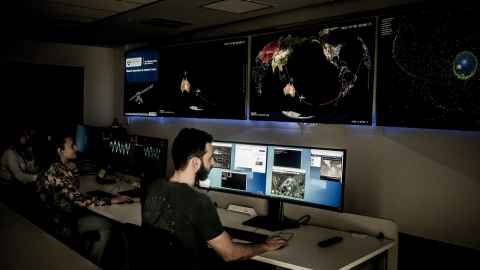University statement on MethaneSAT space mission
2 July 2025
MethaneSAT LLC has confirmed a loss of contact with the MethaneSAT satellite, which the University was scheduled to operate through its Mission Operations Control Centre.

MethaneSAT LLC, owners of the MethaneSAT satellite, issued a statement today confirming a loss of contact with the satellite on Friday 20 June. The satellite has lost power and is anticipated to be unrecoverable.
While this is disappointing news, the Mission Operations Control Centre (MOCC) at Te Pūnaha Ātea – the University of Auckland’s Space Institute – will continue to be a key part of New Zealand's national space infrastructure and provide a significant contribution to capability uplift and delivery of key strategic ambitions in the space sector. The MOCC is also currently being used for the University’s own CubeSat mission, TPA-1, which launched on 23 June 2025.
Over the past four years, the University has built strong capability through this facility and upskilling its team of specialists. The infrastructure and professional expertise established through the MOCC are important assets for New Zealand’s space sector, and the centre will continue to be available as an enduring piece of national infrastructure for future space missions.
The MOCC is an integral part of the University’s work to train the next generation of space scientists and engineers. Over the past year, Te Pūnaha Ātea has supported the research training of 20 masters students and eight PhD candidates.
A cohort of students has received hands-on training in satellite operations at the MOCC, as part of the Spacecraft Operations Programme. The Spacecraft Systems Engineering short course, delivered twice a year from the MOCC, continues to attract professionals from across Aotearoa New Zealand and supports national workforce development.
Outreach has also been a core focus of the University’s involvement in the MethaneSAT programme. Since 2022, Te Pūnaha Ātea has delivered more than 70 outreach events across New Zealand, engaging over 2000 students and members of the public. These have included school visits, workshops, public talks and participation in national STEMM programmes, with an emphasis on engaging women and students from underrepresented communities in science and engineering. We have also profiled the MethaneSAT programme to global leaders and industry interests over this period.
Through these activities, the University remains committed to ensuring that the facilities and capabilities developed over the past four years continue to contribute to New Zealand’s growing space sector.
Professor Guglielmo Aglietti, Director of Te Pūnaha Ātea Space Institute
Read more
Core mission to continue
MethaneSAT update from the Ministry of Business, Innovation & Employment
University media enquiries
Email: mediateam@auckland.ac.nz